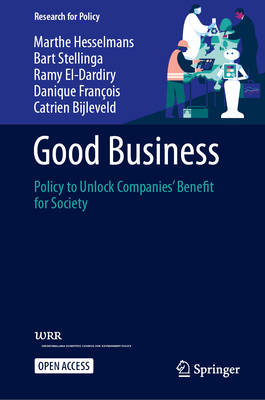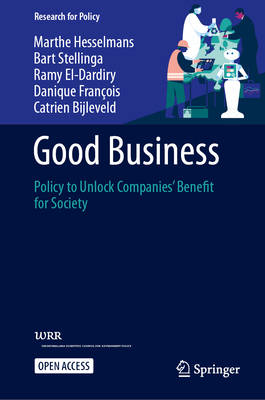
- Afhalen na 1 uur in een winkel met voorraad
- Gratis thuislevering in België vanaf € 30
- Ruim aanbod met 7 miljoen producten
- Afhalen na 1 uur in een winkel met voorraad
- Gratis thuislevering in België vanaf € 30
- Ruim aanbod met 7 miljoen producten
Zoeken
Good Business
Policy to Unlock Companies' Benefit for Society
Marthe Hesselmans, Bart Stellinga, Ramy El-Dardiry, Danique François, Catrien Bijleveld
€ 91,95
+ 183 punten
Omschrijving
This open access book shows how governments can motivate companies to make a positive impact on society and why this is necessary in light of today's pressing social, economic and environmental challenges and transitions. It shows obstacles companies face in conducting socially responsible business. Focusing on government-business relations in the Netherlands, the book also exposes key policy bottlenecks: the tendency of the Dutch government to hold on to the status quo and shield incumbent firms through tax breaks and lax enforcement. There is a real risk of policies that pamper business: it hampers companies that offer societal innovations for instance for health, education or the labour market. We also show how policies can better capitalise on the innovative qualities of entrepreneurship. Effective government policy makes it worthwhile for companies to alter their business model so that their products, services and production processes benefit society. Our recommendations address the role of government, consumers, financiers and companies themselves. While this work focuses on the Netherlands, it tackles questions that countries face worldwide on how to minimise harmful business conduct and maximise good business solutions. This makes the book broadly relevant to policy makers, business leaders and researchers grappling with the impact of business on society today.
Specificaties
Betrokkenen
- Auteur(s):
- Uitgeverij:
Inhoud
- Aantal bladzijden:
- 216
- Taal:
- Engels
- Reeks:
Eigenschappen
- Productcode (EAN):
- 9783031902314
- Verschijningsdatum:
- 2/07/2025
- Uitvoering:
- Hardcover
- Formaat:
- Genaaid
- Afmetingen:
- 156 mm x 234 mm
- Gewicht:
- 503 g

Alleen bij Standaard Boekhandel
+ 183 punten op je klantenkaart van Standaard Boekhandel
Beoordelingen
We publiceren alleen reviews die voldoen aan de voorwaarden voor reviews. Bekijk onze voorwaarden voor reviews.







